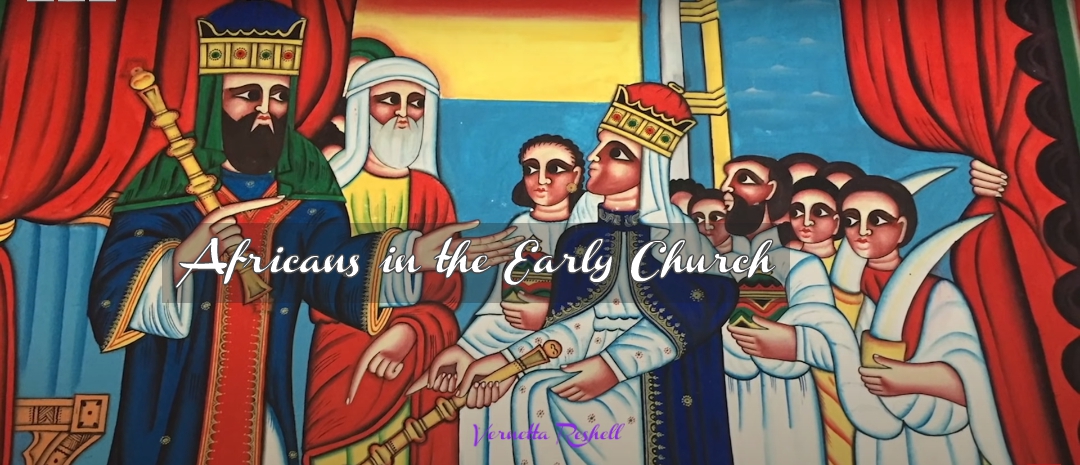So that you may know the exact truth about the things you have been taught [that is, the history and doctrine of the faith].
Luke 1:4 (AMP)
A new series starts today,
“Lineage of The Black Church”.
The history of Christianity on the continent of Africa is diverse, varied and intriguing how it sprung up and was brought from Europe in about 3 different waves after it was already established in the horn and North Africa organically.
But for this post we’ll stick with the origins and how two of those churches still have branches operating to this day. Before we dive into this post take a look at where this post and many others to follow will stem from.
One thing I am sick and tired of seeing, hearing or reading is that Christianity is a “white” man’s religion. It is not. American Christianity is. But Christianity reached Egypt in the 1st century and grew from there. It later came back to North Africa when Christians from modern-day Spain were deported by the Muslim rule. Then Catholicism was brought as missionaries. Finally, Christianity was brought by colonizers of Western and Northern Europe. Now the latter is what most people know about Christianity in Africa.
I want to focus on the first few centuries and the churches that still exist from the original orthodox churches founded in present-day Egypt, Eritrea, Ethiopia. Y’all know about the latter churches. Or what you want to know. But how much do you know about Christianity pulling up in Egypt in the first century? Let me start there and give you a brief history lesson so you understand why I am a Christian. It’s not because it was a “white” man’s religion forced upon me. I left that way of thinking. I chose to come back to Christianity after learning more about the origins of it in Africa. I knew it existed there but was never taught who the early people where, the churches or how the lineage of those early days have continued to present times.
Let’s get an introduction to a few people you need to know about. These people paved the way for Christianity to be spread during the first few centuries in Africa.
These are the Africans in the Early Church:
Tertullian is a Roman African of Berber origin. He believed, “Christians are made, not born”. Well, if it’s a religion we must choose to accept, I don’t see anything wrong with that thinking. When he converted it is said he was decisive and immediate in his decision. He is said to be the “father of Latin Christianity” and “the founder of Western theology”. Even though Tertullian has been erased from many Christian’s histories his work was the basis for people such as Augustine. A lot of what Catholics believe and follow today is through the teachings and writing of this African man. Oh yea, he was one of the early Christian apologists. Yep, he had a very conservative view and it showed in his writings. He lived from 155AD to 240AD.
Vibia Perpetua and Felicity were two out of 6 people arrested and executed for studying Christianity. They are from Carthage in North Africa which is present-day Tunsia. Now they hadn’t been baptized yet. But they were learning about the faith. Felicity was pregnant and Perpetua was a young nursing mother. Felicity was a slave and Perpetua was a married noblewoman. They were martyred and both have become saints. Perpetua wrote a diary leading up to her execution. It was published after her death. It has led to debate of families and gender in the early church. We’re going to say they lived from 182AD to about 203AD. They’re women and one was a slave so you already know little has been done to find out much about them. But I tried my best to share what I found.
Origen of Alexandria is an early Christian scholar and theologian. And one of the first to abstain from “pleasure”. Okay, sir. He was probably born in Alexandria, Egypt. At least that’s what people think since he spent the first half of his life there. Now there’s quite a lot about him that you can research and read yourself. He has written around 2,000 works and is considered “the greatest genius the early church ever produced”. So yea, he really took to Christianity. He’s considered a church father because so much of his writing is used to this day and has been studied over time. One thing that stuck out with me is whether or not he castrated himself. According to research, that’s up for debate. Dude seemed a little eccentric to me but those are usually the ones who really do have deep knowledge. He lived from 184AD to 253AD.
Cyprian was a Bishop of Carthage. Now this man was controversial for his day. He came from a noble and rich Roman African Berber family. They said he had strong pastoral skills. Hmm….so he could lead. I see you, Cyprian. Or just maybe was good at managing things. Who knows? He was eventually martyred by a plague. Whew…like we’re repeating history now. He was considered one of the pre-eminent Latin writers of Western Christianity until Jerome and Augustine came along. He changed his name. His momma and them named him Thascius but after converting he took on a variation of the priest’s name who converted him. He was 35 years old when he converted and gave away a portion of his wealth to the poor when he did. Before he converted, he was in a legal fraternity (how long these been around?) and a great orator. I knew that man could speak. His life before and after baptism was quite interesting to me. He lived (now they don’t know the exact year of his birth which is odd bc this man was rich but whatever) from 200 or 210AD to 258AD.
Athanasius of Alexandria was a Bishop of Alexandria. But dude got exiled like 5 times. 5 times. Unlike the others, he was born into a Christian family. Athanasius was a chief defender of Trinitarianism as well as a theologian. Meaning he believed God was 1 but 3 coeternal persons; the Father, the Son and the Holy Spirit. Which a lot of us today believe that as well. They called him the “Pillar of the Church” and his writings are regarded in both Eastern and Western Christianity. He had a devotion to the ‘Word became man’ ie Jesus fulfilling the prophecy of his birth, death and resurrection. He is also the first person to identify the same 27 books which are the New Testament that are still used to this day in our Bible. He came from a well to do family because he was educated but not in the aristocrat circles. His worked shaped a lot of what we read and study today about the New Testament. He lived from 296 or 298AD to 373AD.
Augustine of Hippo was a theologian, philosopher and the Bishop of Hippo Regius in Numidia, Roman North Africa. In other words, he was the Bishop in present-day Algeria. His writings influenced the development of Western Christianity. And he’s viewed as one of the most important church fathers of early Christian writers. He converted at age 31 and brought is own perspective and approach to theology and philosophy as he was also intrigued by two Persian religions. He believed grace was absolutely necessary to human freedom. He helped to formulate the doctrine of original sin. Chile…..each month that original sin ticks me off. When the Roman empire started to fall apart, he envisioned the church as a City of God. I wonder if that’s why Vatican City exists today? I couldn’t find definitive accuracy on when it was a city other than the legal date of 1929 as an official city-state. But I’m going to go ahead and say yes. Since people been living in the area since around 69AD. He lived from 354AD to 430 AD.
Y’all just don’t know how much reading and research went into condensing this to a few people I felt you should know about who helped to establish Christianity in the horn and North Africa. This was before the Islamic invasion though. I didn’t get a chance to get to the churches because this post was long enough. So, come back next week to learn more about the churches still operating from the times of these OS (Original Saints).


Leave a Reply